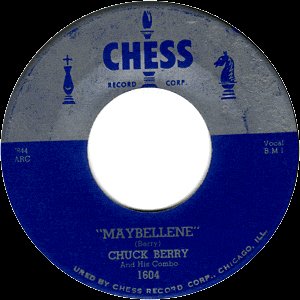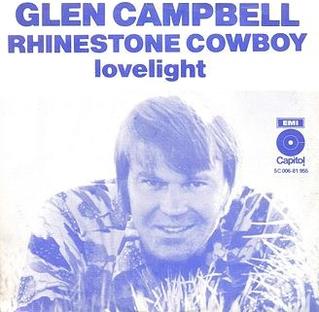
Rockabilly is one of the earliest styles of rock and roll music. It dates back to the early 1950s in the United States, especially the South. As a genre it blends the sound of Western musical styles such as country with that of rhythm and blues, leading to what is considered "classic" rock and roll. Some have also described it as a blend of bluegrass with rock and roll. The term "rockabilly" itself is a portmanteau of "rock" and "hillbilly", the latter a reference to the country music that contributed strongly to the style. Other important influences on rockabilly include western swing, boogie-woogie, jump blues, and electric blues.

"Gentle on My Mind" is a song that was written and originally recorded by John Hartford, and released on his second studio album, Earthwords & Music (1967). Hartford composed the song after watching Doctor Zhivago in 1966, as he was inspired by the film and his own personal experiences. The lyrics describe the reminiscences of lost love of a man as he travels through the country. The following year, Hartford released the song as a single on RCA Records.

James Cecil Dickens, better known by his stage name Little Jimmy Dickens, was an American country music singer and songwriter famous for his humorous novelty songs, his small size, and his rhinestone-studded outfits. He started as a member of the Grand Ole Opry in 1948 and was inducted into the Country Music Hall of Fame in 1983. Before his death he was the oldest living member of the Grand Ole Opry.

Felice Bryant and Diadorius Boudleaux Bryant were an American husband-and-wife country music and pop songwriting team. They were best known for songs such as "Rocky Top," "We Could", "Love Hurts", and numerous hits by the Everly Brothers, including "All I Have to Do Is Dream", "Bye Bye Love", and "Wake Up Little Susie".

"Fever" is a song written by Eddie Cooley and Otis Blackwell, who used the pseudonym John Davenport. It was originally recorded by American R&B singer Little Willie John for his debut album, Fever (1956), and released as a single in April of the same year. The song topped the Billboard R&B Best Sellers in the US and peaked at number 24 on the Billboard pop chart. It was received positively by music critics and included on several lists of the best songs during the time it was released.

"Maybellene" is a rock and roll song. It was written and recorded in 1955 by Chuck Berry, adapted in part from the Western swing fiddle tune "Ida Red". Berry's song told the story of a hot rod race and a broken romance, the lyrics describing a man driving a V8 Ford and chasing his unfaithful girlfriend in her Cadillac Coupe DeVille. It was released in July 1955 as a single by Chess Records, of Chicago, Illinois. Berry's first hit, "Maybellene" is considered a pioneering rock and roll song. Rolling Stone magazine wrote of it, "Rock & roll guitar starts here." The record was an early instance of the complete rock and roll package: youthful subject matter; a small, guitar-driven combo; clear diction; and an atmosphere of unrelenting excitement.
"Chattanoogie Shoe Shine Boy" is a popular song written by Harry Stone and Jack Stapp and published in 1950. It is the signature song of Red Foley who recorded it in late 1949. The song has been covered by many artists including Bing Crosby, Frank Sinatra, and Faron Young who scored a hit with the song in 1959.

"Hey, Good Lookin'" is a 1951 song written and recorded by Hank Williams, and his version was inducted into the Grammy Hall of Fame in 2001. In 2003, CMT voted the Hank Williams version No. 19 on CMT's 100 Greatest Songs of Country Music. Since its original 1951 recording it has been covered by a variety of artists.
"Have I Told You Lately That I Love You?" is a popular song written by Scotty Wiseman for the 1944 musical film, Sing, Neighbor, Sing and performed by Lulu Belle and Scotty. It was the greatest hit of Wiseman and his wife and one of the first country music songs to attract major attention in the pop music field. Its repeating fourth line is "Well darling, I'm telling you now." Although it was featured in the movie, it wasn't released by them until 1947. The first released version of this song was by Gene Autry in 1945.

Gene Louis O'Quin was an American country and western and honky tonk singer born in Dallas on September 9, 1932 He established himself professionally at Dallas' Big "D" Jamboree, a Grand Ole Opry-like radio showcase, becoming one of its most popular entertainers. O'Quin recorded his first song at the age of 15 and was signed by Capitol Records.

"Rhinestone Cowboy" is a song written by Larry Weiss and recorded by American country music singer Glen Campbell. When released on May 26, 1975, as the lead single and title track from his album Rhinestone Cowboy, it enjoyed huge popularity with a both country and pop audiences.

Hillbilly Deluxe is the second album by country music singer-songwriter, Dwight Yoakam. Released in 1987, it was Yoakam's second consecutive No. 1 album on the Billboard Country Albums chart. Four tracks were released as singles with each becoming Top 10 hits on the Hot Country Singles chart in 1987 and 1988.

"Fever" is a song by American hard rock band Aerosmith. It is from the band's massively successful 1993 album Get a Grip. It was written by Steven Tyler and Joe Perry and is the only Tyler/Perry song on Get a Grip written without the aid of "song doctors". The song is the fourth track on Get a Grip, running four minutes and 15 seconds. The song reached #5 on the Billboard Mainstream Rock Tracks chart and is one of seven tracks from Get a Grip to make a chart appearance on any chart.
"San Antonio Rose" is a swing instrumental introduced in late 1938 by Bob Wills and His Texas Playboys. Quickly becoming the band's most popular number, Wills and band members devised lyrics, which were recorded on April 16, 1940, and released on Okeh 5694 in August as "New San Antonio Rose". Despite having completed a lengthy Hillbilly/Folk chart run in 1939, which culminated at #1, it quickly rose to the top again, in early 1941. It went on to become the band's theme song for the next forty years, reverting to its original title.
"Shame on You" is a Western Swing song written by Spade Cooley and became his signature song.
"Big Blue Diamonds" is a song written by Earl J. (Kit) Carson in 1950 and published by Lois Music, BMI. It was first recorded by the country singer, Red Perkins, and originally issued as a 78 rpm single on King Records #903 b/w "Rag Man Boogie" in 1950. Many artists have recorded the song throughout the years, sometimes with a variation of the title including: "Blue Diamond", "Big Blue Diamond", and "Big Blue Diamonds".
"If You've Got the Money " is a debut song co-written and recorded by American country music artist Lefty Frizzell, released on September 14, 1950. The song is the second song recorded by Lefty Frizzell during his first session with Columbia Records in July 1950. The song rose to number one.
"Cincinnati Dancing Pig" is a country music song written by Guy Wood (music) and Al Lewis (lyrics), sung by Red Foley, and released on the Decca label. It was a novelty song about a dancing pig that included squealing and grunting sounds.

"Fujiyama Mama" is a song written by Jack Hammer. It was first recorded in 1955 by Annisteen Allen, and in 1957 by rockabilly singer Wanda Jackson, both for Capitol. It did not chart in the United States, but Jackson's recording became a No. 1 hit in Japan for several months in 1958.

George Vaughn Horton was an American songwriter and performer. Usually credited as "Vaughn Horton" or "George Vaughn", he wrote or contributed to the success of a number of popular songs, including Choo Choo Ch'Boogie, Hillbilly Fever, Sugar-Foot Rag, Mockin' Bird Hill, and the Christmas song Jolly Old Saint Nicholas.













